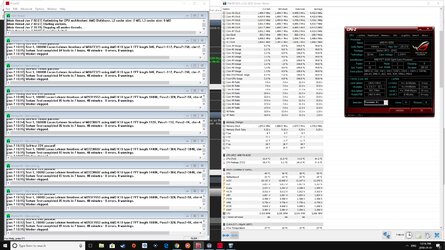Asus Crosshair V
FX 8350
32 GB ram 2133 mhz
I had my FX 8350 stable at 4.3 Ghz with many hours of prime95 behind that clock.
I decided to overclock my FX 8350 to 4.4 Ghz. It passed prime for about half an hour.
I ran 3dMark through and did fine. I ran a bunch of video games today and it was fine.
The settings I used was increasing the voltages 1.325 and putting Load Line Calibration to Extreme.
This setting boosted the voltages to 1.344 under load. And this is the voltage that was boosted for at Prime Testing.
The problem lies here. I was trying to watch a Blu-ray video and it kept freezing. I did a bunch of things.
Re-install the software, sfc scan look for corrupt files, and it didn't help.
Then I went and put Load Line Calibration back to 'auto' and increased the vcore to 1.344.
Now my Blu-Ray plays without freezing.
Has anyone else noticed that relying on Load Line Calibration Voltage boosts provides instability in any circumstances?
The reason why this bothers me is because I have a Ryzen 5 1600 overclocked to 3.825 Ghz.
It passed all my prime tests, cinebench, and seems stable.
I have load line calibration set to extreme with the Ryzen 5 1600 and voltages set to auto on that system.
When at load the CPU vcore is 1.27... and at idle it goes down to .4 or .68; something extremely low.
The question is... could my Ryzen 5 1600 be secretly unstable? Since I am using LLC voltage boosts for stability at full load.
Any insight anyone? or has Ryzen changed alot. The only reason I messed with LLC on the FX8350 is because it seemed alright for Ryzen....
I have used LLC on intel i5 6600k for stability voltages. It seemed to work... but I never played a Blu-Ray on that system....
Again any thoughts about this?
FX 8350
32 GB ram 2133 mhz
I had my FX 8350 stable at 4.3 Ghz with many hours of prime95 behind that clock.
I decided to overclock my FX 8350 to 4.4 Ghz. It passed prime for about half an hour.
I ran 3dMark through and did fine. I ran a bunch of video games today and it was fine.
The settings I used was increasing the voltages 1.325 and putting Load Line Calibration to Extreme.
This setting boosted the voltages to 1.344 under load. And this is the voltage that was boosted for at Prime Testing.
The problem lies here. I was trying to watch a Blu-ray video and it kept freezing. I did a bunch of things.
Re-install the software, sfc scan look for corrupt files, and it didn't help.
Then I went and put Load Line Calibration back to 'auto' and increased the vcore to 1.344.
Now my Blu-Ray plays without freezing.
Has anyone else noticed that relying on Load Line Calibration Voltage boosts provides instability in any circumstances?
The reason why this bothers me is because I have a Ryzen 5 1600 overclocked to 3.825 Ghz.
It passed all my prime tests, cinebench, and seems stable.
I have load line calibration set to extreme with the Ryzen 5 1600 and voltages set to auto on that system.
When at load the CPU vcore is 1.27... and at idle it goes down to .4 or .68; something extremely low.
The question is... could my Ryzen 5 1600 be secretly unstable? Since I am using LLC voltage boosts for stability at full load.
Any insight anyone? or has Ryzen changed alot. The only reason I messed with LLC on the FX8350 is because it seemed alright for Ryzen....
I have used LLC on intel i5 6600k for stability voltages. It seemed to work... but I never played a Blu-Ray on that system....
Again any thoughts about this?
